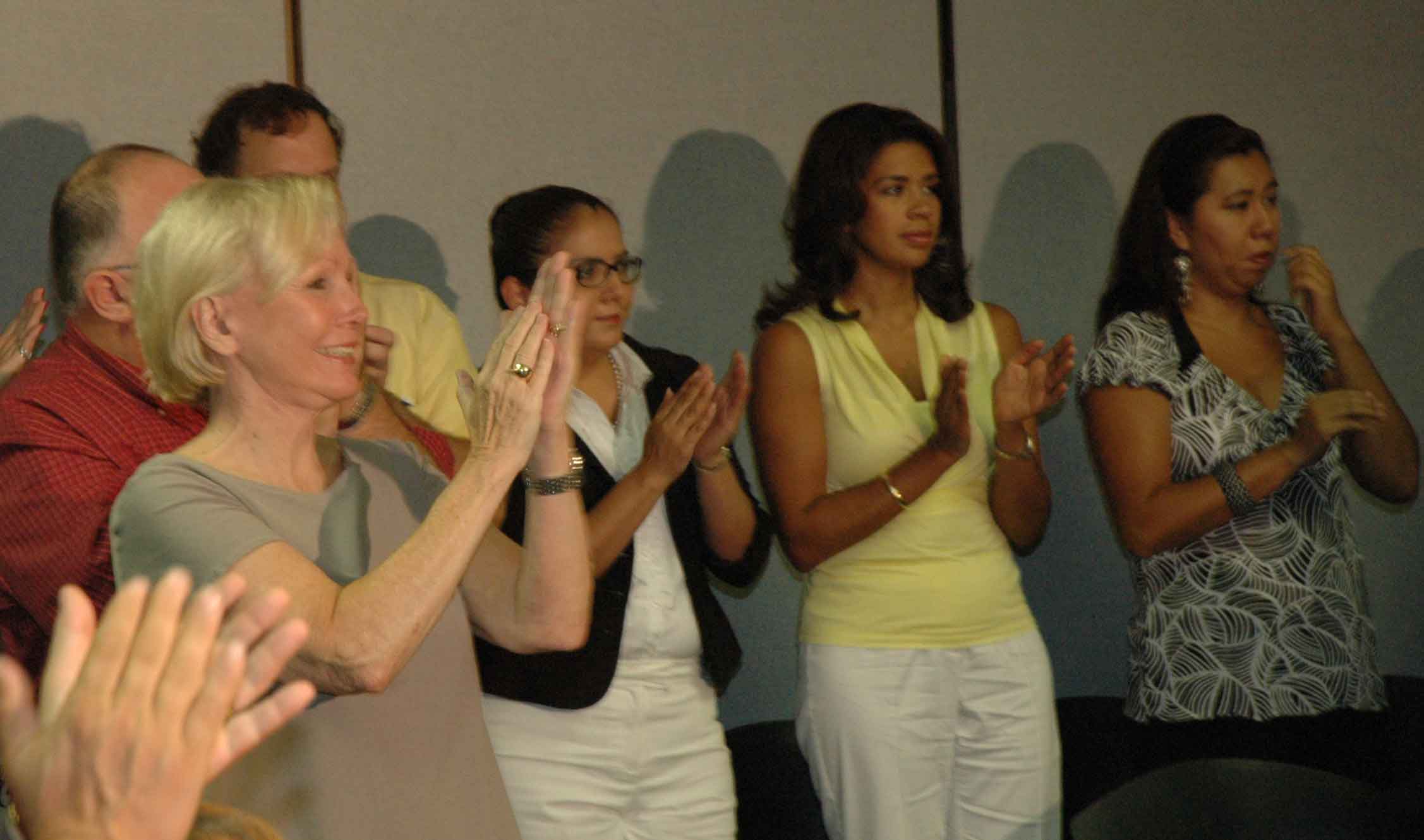Final days of negotiations were key to Daley deal... Stewart's Sellout
 More than 100 union members chanted "No!" outside Marilyn Stewart's press conference on August 31, 2007. The spontaneous demonstration of anger took place after Stewart had hastily exited the tumultuous meeting without counting the "Yes" and "No" votes — and refusing to take the "No" vote at all. Many delegates didn't even realize that Stewart had adjourned the meeting and headed down a back stairway to a press conference until they were told that Stewart was meeting with the press behind security guarded doors on the first floor of the building. As the press conference began, loud chants of "No!" "No!" echoed from the hall outside the media event. Stewart's security people tried to prevent reporters from leaving the press conference, but failed. The story, which continued to unfold throughout the school year, was not in the official words of the President of the Chicago Teachers Union, but in the experiences of the hundreds of union delegates who witnessed how Stewart rigged the August 31 vote. Substance photo by George N. Schmidt.By the time the Chicago Teachers Union began distributing copies of the new, 271 page contract in the city’s remaining unionized public schools on April 21, 2008, the union’s more than 30,000 members had more questions than answers about both the “Agreement” (as it is called officially) and how it was negotiated and ratified by the CTU members after being recommended by CTU President Marilyn Stewart and some of the union’s leadership.
More than 100 union members chanted "No!" outside Marilyn Stewart's press conference on August 31, 2007. The spontaneous demonstration of anger took place after Stewart had hastily exited the tumultuous meeting without counting the "Yes" and "No" votes — and refusing to take the "No" vote at all. Many delegates didn't even realize that Stewart had adjourned the meeting and headed down a back stairway to a press conference until they were told that Stewart was meeting with the press behind security guarded doors on the first floor of the building. As the press conference began, loud chants of "No!" "No!" echoed from the hall outside the media event. Stewart's security people tried to prevent reporters from leaving the press conference, but failed. The story, which continued to unfold throughout the school year, was not in the official words of the President of the Chicago Teachers Union, but in the experiences of the hundreds of union delegates who witnessed how Stewart rigged the August 31 vote. Substance photo by George N. Schmidt.By the time the Chicago Teachers Union began distributing copies of the new, 271 page contract in the city’s remaining unionized public schools on April 21, 2008, the union’s more than 30,000 members had more questions than answers about both the “Agreement” (as it is called officially) and how it was negotiated and ratified by the CTU members after being recommended by CTU President Marilyn Stewart and some of the union’s leadership.
Every week, it seemed, another bad surprise was coming in the deal Stewart had claimed was the best contract ever.
In February 2008, 18 schools discovered that Stewart had given the Daley administration a green light to close or reorganize as many schools as possible. In March and April, it was IMPCT and the continuation of problems with the payroll and benefit days (that the union could not apparently solve) that persisted more than a year after the first payroll problems began. By early May, an entirely new set of problems became clear when union members tried to renew prescription drugs under the medial insurance plans Stewart had allowed CPS to impose on the union’s dwindling membership. Those with a sense of history could note that Marilyn Stewart’s first contract took longer from ratification (on September 10, 2007) to distribution in printed form than any other contract during the 40 years since the union first signed a written contract in 1968. Two days before the House of Delegates meeting that took place on the Friday beginning Labor Day weekend 2007, the Chicago Teachers Union held a press conference at the union's Merchandise Mart offices to announce that the negotiators had reached an agreement. Above, CTU lawyer Lawrence Poltrock (center, with hand in pockets) oversees the press briefing from union publicist Rose Maria Genova. Substance Photo by George N. Schmidt.
Two days before the House of Delegates meeting that took place on the Friday beginning Labor Day weekend 2007, the Chicago Teachers Union held a press conference at the union's Merchandise Mart offices to announce that the negotiators had reached an agreement. Above, CTU lawyer Lawrence Poltrock (center, with hand in pockets) oversees the press briefing from union publicist Rose Maria Genova. Substance Photo by George N. Schmidt.
Those with a sense of aesthetics wondered why the contract was printed at an abnormal size (for the first time in more than three decades. Instead of the convenient 4” by 7” format that had been the norm, the new contract was 5.5” by 7.5” and no longer fit into a pocket. Some were also asking why the contract had the most bizarre coloring of any in history. The green-on-purple cover led more than one union member to suggest that the design might have been done by someone who was color blind.
Surrendering to the Imperial Mayor under the tutelage of Pam Massarsky
But what was more interesting to those who were trying to explain what had happened to a union which had once been the most powerful in Chicago were the details of how Stewart had given the Board of Education what it wanted during the final two weeks of negotiations in August 2007, while telling the members that she was prepared to be militant — and even lead a strike if necessary — to win back the power of the Chicago Teachers Union.
What had happened in August 2007?
During the crucial final days of contract negotiations for what would become the longest contract in Chicago Teachers Union history (five years, ending in 2012), CTU President Marilyn Stewart took the unprecedented step of dismissing most of the union’s officers and the union’s attorneys from the bargaining table, according to sources familiar with the events. Stewart instead chose to negotiate the final terms of the agreement with the assistance of only one person: CTU Legislative Director Pam Massarsky. When the union holds a press conference, all of the union's staff members are ordered to cheer the leadership. Above, staff cheering during the August 29, 2007, press conference. Substance photo by George N. Schmidt.
When the union holds a press conference, all of the union's staff members are ordered to cheer the leadership. Above, staff cheering during the August 29, 2007, press conference. Substance photo by George N. Schmidt.
Massarsky is a retired union officer whose total pension is in excess of $100,000 per year. She served for more than a dozen years as CTU Recording Secretary under now deceased President Tom Reece. Massarsky, who still works as the union’s lobbyist in Springfield, is a consultant for the union, paid an amount that is not disclosed in the union’s annual budget.
According to a number of sources, Stewart and Massarsky spent the final week of negotiations on the contract working closely with Charlie Rose, an outside attorney who did most of the collective bargaining work for the Chicago Board of Education. Rose is a partner in the law firm of Franczek Sullivan PC, which has received more than $1 million as an outside law firm from CPS during the past year. Although an attorney for the Board was also present, the real power was in the hands of Rose, just as the power on the union side rested with Massarsky.
An ongoing investigation by Substance reporters and staff is beginning to assemble a complete picture of how Marilyn Stewart played the members of the Chicago Teachers Union with militant rhetoric in early August 2007 while preparing to give the Daley administration the most favorable contract that management had seen in the 40 year history of teacher collective bargaining in Chicago. To date, sources on both sides of the issue who have direct knowledge of the negotiations and the final disposition of the contract have asked to be off the record. As the first anniversary of the controversial August 31 House of Delegates meeting approaches and the majority of the members of the union learn how bad the Stewart contract is, this becomes an ongoing story for Substance. Because CTU documents are not subject to the Freedom of Information Act and Stewart herself refuses to talk with Substance, these reports will be based on information provided by reliable sources who had direct knowledge of the negotiations.
The following is now clear.
Limiting those at the bargaining table
By the second week of August, Stewart had limited those at the bargaining table on the union side to herself and Massarsky, eliminating the other union officers and even the union’s lead attorney, Lawrence Poltrock.
Union vice-president Ted Dallas refused to leave the negotiations. As an elected officer, he had standing despite Stewart’s attempts to exclude him. The other three union officers (Recording Secretary Mary McGuire; Financial Secretary Mark Ochoa; and Treasurer Linda Porter) were not at the table during the key days at the finish line.
An examination of the information provided by Stewart to the union’s delegates on August 31 and to the union’s members between August 31 and the September 10 referendum on the contract shows that a great deal was left out of the information in order for the leadership to sell the contract. Among the surprises that are still below the surface of the agreement are the ultimate price the union’s members will pay for Stewart’s failure to restrict the Board of Education’s ability to close and reorganize schools under “Renaissance 2010” or other programs to privatize public education.
The additional costs to the members of the health “insurance” programs give the Board the ability to raise the cost to members of the medical insurance programs without much protection for the members. What was already the most expensive benefit package among the locals of the American Federation of Teachers will surpass even the worst nightmares of the members by the time the five-year contract expires in 2012, two years after the next union election.

